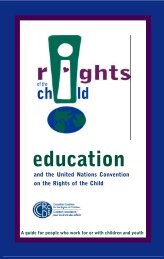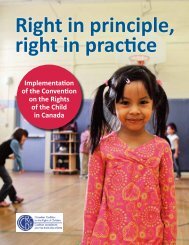Poste - Canadian Coalition for the Rights of Children
Poste - Canadian Coalition for the Rights of Children
Poste - Canadian Coalition for the Rights of Children
You also want an ePaper? Increase the reach of your titles
YUMPU automatically turns print PDFs into web optimized ePapers that Google loves.
Visa Restrictions<br />
C A N A D I A N C O A L I T I O N F O R T H E R I G H T S O F C H I L D R E N<br />
The Immigration Review Advisory Group notes that<br />
Canada has, at times, used “visa requirements as a tool<br />
<strong>for</strong> limiting in-Canada refugee claims, both by groups<br />
having a high percentage <strong>of</strong> non-genuine claims (Chile)<br />
and by those making many successful claims (Sri Lanka,<br />
Czech Republic).” 55 There is concern that using visa<br />
requirements to limit <strong>the</strong> flow <strong>of</strong> refugee claimants may<br />
hinder “genuine asylum seekers from reaching Canada.”<br />
Canada currently requires nationals <strong>of</strong> more than 100<br />
countries to obtain a visa in order to enter <strong>the</strong> country.<br />
As well, <strong>the</strong> Joint Centre <strong>of</strong> Excellence <strong>for</strong> Research on<br />
Immigration and Settlement--Toronto says that:<br />
Persons subject to persecution, as defined by<br />
article 1 <strong>of</strong> <strong>the</strong> Geneva Convention and<br />
Protocols, are not likely to have <strong>the</strong> time or<br />
freedom to participate in a lengthy visa<br />
acquisition process. In effect, Canada is asking<br />
asylum seekers to demonstrate <strong>the</strong> legitimacy <strong>of</strong><br />
<strong>the</strong>ir asylum claims from <strong>the</strong> country in which<br />
<strong>the</strong> persecution is taking place. This is in direct<br />
contravention <strong>of</strong> article 3 <strong>of</strong> <strong>the</strong> Geneva<br />
Convention and Protocols, which protects<br />
asylum applicants from discrimination based<br />
on <strong>the</strong>ir country <strong>of</strong> origin. 56<br />
Convention Refugee Determination<br />
Division Process<br />
Refugee status in Canada is determined through a hearing<br />
into <strong>the</strong> refugee claimant’s circumstances to determine<br />
whe<strong>the</strong>r <strong>the</strong>re is a serious likelihood that he/she will be<br />
persecuted if he/she returns to his/her home country.<br />
Summary <strong>of</strong> <strong>the</strong> Process57 When a person claims Convention refugee status in<br />
Canada, <strong>the</strong> process is as follows.<br />
• Person makes claim <strong>of</strong> being a Convention refugee to<br />
an immigration <strong>of</strong>ficer.<br />
• Senior immigration <strong>of</strong>ficer determines if claim is<br />
eligible under <strong>the</strong> Immigration Act. (For ineligible<br />
claims, see box below.)<br />
• If claim is eligible, it is referred to <strong>the</strong> Refugee<br />
Determination Division (also known as <strong>the</strong> Refugee<br />
Board).<br />
• The claim is heard in an oral hearing which is to be<br />
conducted in an in<strong>for</strong>mal and non-adversarial manner.<br />
Generally, two Refugee Board members (who are<br />
independent decision makers) hear <strong>the</strong> claim and in<br />
108<br />
most cases, a favourable decision by only one<br />
board member will determine that a person is a<br />
Convention refugee. (For decisions requiring a<br />
favourable decision by both members, see sidebar.)<br />
• Claimants have <strong>the</strong> right to full participation in <strong>the</strong><br />
process.<br />
• Claimants have a right to be represented by a<br />
lawyer, a friend, a relative or anyone else who can<br />
help <strong>the</strong>m make <strong>the</strong>ir submission.<br />
• Claimants have <strong>the</strong> right to services <strong>of</strong> an<br />
interpreter if necessary.<br />
• Claimants have <strong>the</strong> full protection <strong>of</strong> <strong>the</strong> <strong>Canadian</strong><br />
Charter <strong>of</strong> <strong>Rights</strong> and Freedoms.<br />
• The presentation and acceptance <strong>of</strong> evidence is not<br />
restricted by technical or legal rules <strong>of</strong> evidence.<br />
• If <strong>the</strong> panel determines that <strong>the</strong> claimant is a<br />
Convention refugee, <strong>the</strong>n <strong>the</strong> claimant may apply<br />
to become a permanent resident <strong>of</strong> Canada.<br />
Immediate family members, whe<strong>the</strong>r in Canada<br />
or abroad, may be included on <strong>the</strong> application.<br />
• If <strong>the</strong> panel decides that <strong>the</strong> claimant is not a<br />
Convention refugee, <strong>the</strong> claimant may apply <strong>for</strong> a<br />
judicial review by <strong>the</strong> Federal Court, Trial Division.<br />
If leave is granted, <strong>the</strong> claimant will have <strong>the</strong> case<br />
reviewed by <strong>the</strong> Federal Court. The Federal Court<br />
can return <strong>the</strong> claim to <strong>the</strong> Refugee Division <strong>for</strong> a<br />
rehearing. Or, if <strong>the</strong> Federal Court does not hear<br />
or rejects <strong>the</strong> claim, immigration <strong>of</strong>ficials may<br />
conduct a post-determination review to determine<br />
if removal from Canada would result in significant<br />
personal risk to <strong>the</strong> claimant. Prior to May 1997,<br />
post-determination risk reviews were automatic.<br />
However, new regulations permit risk reviews,<br />
but eligibility criteria are tightened.<br />
• If <strong>the</strong> post-determination review finds that <strong>the</strong><br />
claimant is a Convention refugee or would be at<br />
great risk if removed from Canada, <strong>the</strong> claimant is<br />
entitled to apply <strong>for</strong> permanent residency.<br />
• If <strong>the</strong> above review makes a negative finding, a<br />
removal order is made against <strong>the</strong> individual.<br />
• At any time throughout <strong>the</strong> refugee determination<br />
process, an individual may apply to <strong>the</strong> Minister<br />
<strong>for</strong> an exemption from a regulation or <strong>for</strong> admission<br />
to Canada based on compassionate or humanitarian<br />
considerations.




